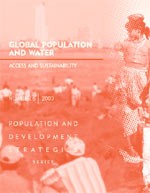Press Release
Investments in Reproductive Health Can Reduce Water Insecurity, Says UNFPA Report
19 March 2003
Press Release
19 March 2003
UNITED NATIONS, New York - Population growth is a driving factor in the world's growing water crisis. Under current trends, two thirds of the world's population may face moderate to high water shortages in 2025. Investments inreproductive health, including family planning, can help slow population growth and reduce water insecurity, according to a new report by UNFPA, the United Nations Population Fund.

The report, Global Population and Water, was released today at the Third World Water Forum in Kyoto, Japan. More than 10,000 delegates are scheduled to attend the session this week to seek ways to tackle the water crisis and help the 1.4 billion people without access to safe drinking water.
Exposure to contaminated water is linked to pregnancy failures as well as infant illnesses and deaths, according to the report. Lack of access to safe water and sanitation, especially in rural areas and poor communities, obliges women to spend hours every day collecting water from communal taps or directly from streams and rivers. This exposes them and their children to malaria and to water-related diseases that affect their reproductive health.
"Water is a vital and precious resource and so are people," said Thoraya Ahmed Obaid, UNFPA's Executive Director. "We must all take additional measures to protect our water sources and increase people's access to clean water. This will help improve women's health and reduce maternal and child deaths."
World population grows by 77 million people each year, with the bulk in developing countries. By 2025, the report states, 5 billion of the world's 7.9 billion people will be living in areas where it will be difficult or even impossible to meet basic water needs for drinking, cooking and sanitation if present water consumption rates are maintained. Between now and 2025, the total water use is projected to increase by 40 per cent.
Increased access to education and health care, including reproductive health and family planning, will improve livelihoods and expand opportunities for women in regions with water shortages. This would also help slow population growth and reduce pressure on water supplies.
- - -
UNFPA is the world's largest multilateral source of population assistance. Since it became operational in 1969, it has provided about $6 billion to developing countries to meet reproductive health needs and support development efforts.
Contact Information:
Micol Zarb
Tel.: +1 212 297 5042